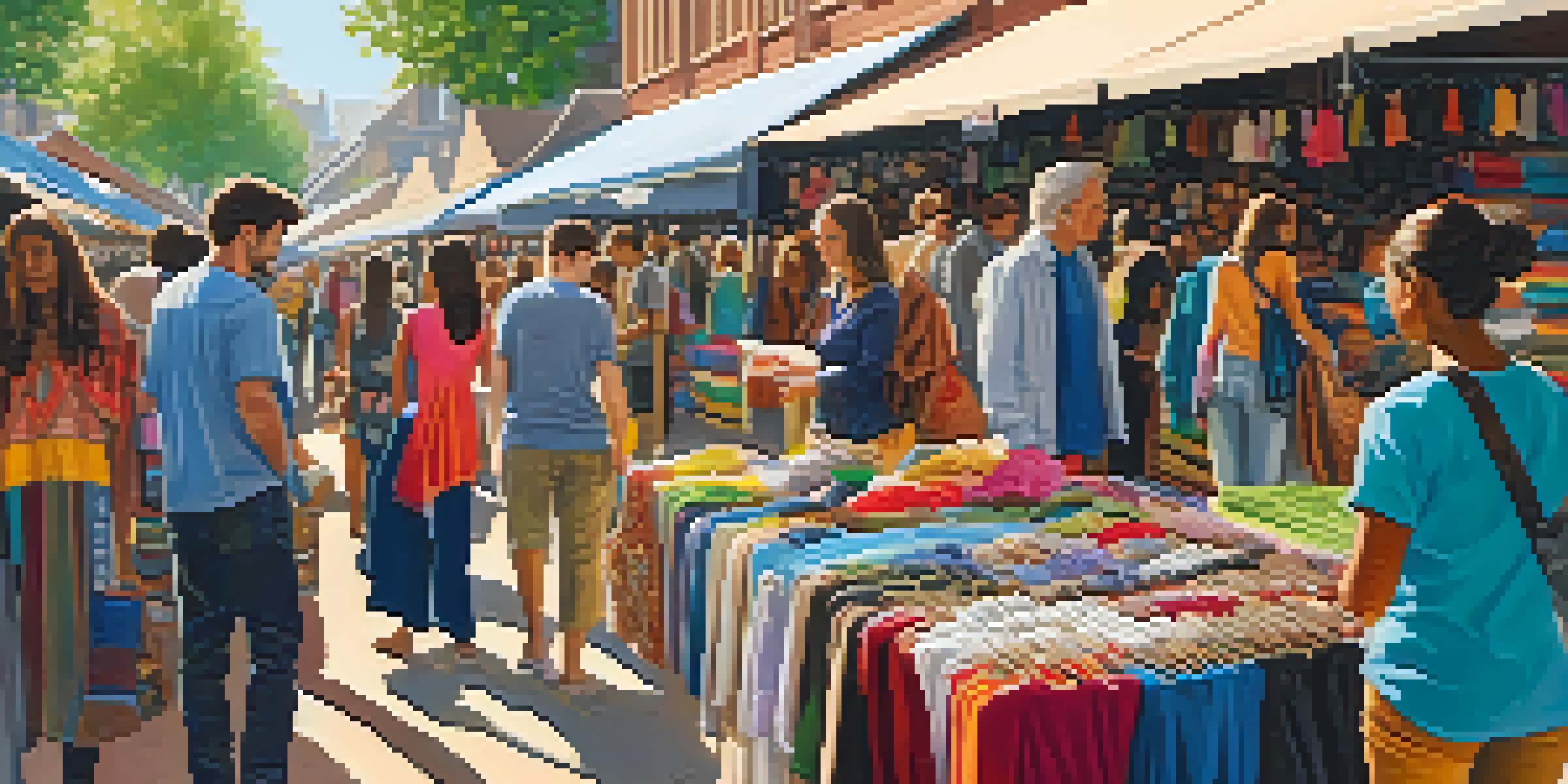The Future of Fashion: Trends in Ethical and Sustainable Practices

Understanding Ethical Fashion: What It Means Today
Ethical fashion refers to clothing that is produced in a way that respects both people and the planet. This means fair wages for workers, safe working conditions, and sustainable materials that minimize environmental impact. As consumers become more conscious of their choices, the definition of ethical fashion continues to evolve, reflecting broader values of social responsibility.
Fashion is the second most polluting industry in the world, right after oil.
Today, it’s not just about the clothes themselves but also the processes behind their creation. Brands are increasingly transparent about their supply chains, allowing customers to make informed decisions. This shift towards transparency is essential, as it helps foster trust between consumers and brands, ensuring that ethical considerations are at the forefront.
As we look to the future, understanding what ethical fashion truly entails will be crucial. It's about creating a system that prioritizes sustainability, fairness, and community well-being, paving the way for a more responsible industry.
The Rise of Sustainable Materials in Fashion
Sustainable materials play a significant role in reducing fashion's environmental impact. Innovations like organic cotton, Tencel, and recycled polyester are gaining traction, offering alternatives to conventional textiles that often harm the environment. These materials not only help in conserving resources but also promote better practices in the industry.

For instance, brands are exploring materials made from agricultural waste or even ocean plastic, transforming what was once pollutive into something beautiful and wearable. This creative approach not only addresses waste issues but also showcases the potential for circular fashion, where products are designed with their end-of-life in mind.
Ethical Fashion Reshapes Industry
Ethical fashion emphasizes fair labor practices and sustainable materials, driving a shift in consumer awareness and brand transparency.
As sustainable materials become more mainstream, we can expect a shift in consumer behavior. Shoppers are increasingly seeking out brands that prioritize these eco-friendly options, illustrating a growing demand for responsible fashion choices.
The Impact of Technology on Sustainable Fashion
Technology is revolutionizing the fashion industry, especially in the realm of sustainability. From 3D printing to AI-driven design, tech advancements are helping brands reduce waste and streamline production processes. These innovations can lead to more efficient use of resources while allowing for greater creativity and customization.
Sustainable fashion is not a trend; it’s a necessity.
For example, companies are using AI to predict fashion trends and consumer preferences, enabling them to produce only what is necessary. This predictive approach minimizes overproduction, a significant problem in the fashion world that contributes to massive waste. By aligning production with actual demand, brands can significantly lower their environmental footprint.
Moreover, tech tools such as blockchain are enhancing traceability in the supply chain. This level of transparency can empower consumers to make more ethical decisions, reinforcing the connection between technology and sustainability in fashion.
Consumer Behavior: Shifting Towards Conscious Choices
Today's consumers are more informed and concerned about the environmental and social impacts of their purchases. This shift towards conscious consumerism is reshaping the fashion landscape, as people seek brands that align with their values. As a result, companies are responding by adopting sustainable practices to cater to this growing demand.
For instance, many consumers are now prioritizing quality over quantity, choosing to invest in timeless pieces rather than fast fashion items. This change not only encourages brands to produce more durable products but also fosters a culture of thoughtful consumption, where the focus shifts from rapid turnover to lasting value.
Sustainable Materials on the Rise
Innovative materials like organic cotton and recycled polyester are becoming more popular, promoting eco-friendly practices in the fashion industry.
As this trend continues, brands that fail to adapt may find themselves left behind. The future of fashion lies in understanding and meeting the needs of a more conscious consumer base that values ethical practices and sustainability.
Innovations in Fashion Recycling and Upcycling
Recycling and upcycling are gaining momentum within the fashion industry as brands look for ways to minimize waste. Upcycling transforms discarded materials into new products, giving them a second life while reducing the demand for new resources. This creative process not only helps the environment but also adds unique value to each piece.
Brands like Reformation and Patagonia are leading the charge by incorporating recycled materials into their collections. They demonstrate how companies can embrace sustainable practices without sacrificing style or quality. This approach challenges the traditional fashion model, encouraging consumers to rethink what it means to buy new.
As the recycling movement expands, we can expect to see more collaborations between brands and artists, turning waste into wearable art. This trend reinforces the idea that sustainability can be both innovative and fashionable.
The Role of Regulations in Promoting Sustainability
As the demand for ethical fashion grows, governments and organizations are beginning to implement regulations aimed at promoting sustainability. These measures can help hold brands accountable for their practices and encourage them to adopt more responsible approaches. By setting standards for environmental impact and labor rights, regulations can drive significant change in the industry.
For instance, some countries are enforcing stricter guidelines around waste management and emissions, pushing brands to rethink their production methods. These policies not only protect the environment but also create a level playing field for companies that are genuinely committed to sustainability.
Technology Boosts Sustainability
Advancements in technology, such as AI and blockchain, are enhancing sustainability by optimizing production processes and improving supply chain transparency.
As regulations evolve, they will likely influence consumer perceptions and expectations as well. A more regulated fashion industry can lead to greater trust among consumers, who will increasingly demand transparency and accountability from the brands they support.
Community Engagement and the Future of Fashion
Community engagement is becoming a vital aspect of sustainable fashion, as brands recognize the importance of connecting with their consumers. Many companies are fostering relationships with local communities and artisans, creating a sense of belonging and shared purpose. This approach not only enhances brand loyalty but also supports ethical practices at a grassroots level.
For example, initiatives that involve local craftsmanship promote traditional skills while empowering communities. By investing in local talent, brands can create unique, culturally rich products that resonate with consumers seeking authenticity and connection.

As community engagement grows, we can expect to see a shift in how fashion brands operate. Emphasizing collaboration and shared values will be essential for building a sustainable future that truly benefits everyone involved in the fashion ecosystem.